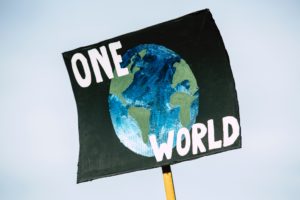As Europe slowly emerges from the Covid-19 pandemic, Agata Meysner, Director of Generation Climate Europe, argues that we have a unique opportunity to redesign our economic system to fit within the Earth’s planetary boundaries and that the EU needs to move beyond the growth-oriented fossil fuel economy to create a green and just transition for Europe’s youth and future generations.

Economy for a finite planet
With the introduction of the European Green Deal by the von der Leyen Commission, a number of strategies have been put forward regarding biodiversity, circular economy, agriculture and more. However, despite a stronger focus on environmental issues, the underlying mission of the European Green Deal does not sufficiently address the causes of the climate crisis.
The European Green Deal has been promoted as a “‘new growth strategy”’ for the EU. It aims to decouple economic growth from resource use, despite the fact that a number of scientific studies have shown that absolute decoupling of economic growth from environmental pressures is impossible. We need a systemic solution to move beyond growth and do it fast, as reaching any of our planet’s tipping points will leave us in a place of no return.
Redesigning the economic system to fit planetary boundaries must become our priority in order to ensure that we address the climate and biodiversity crises with the greatest urgency. Decisions that we take now will have a massive impact on young people and future generations. We are now in a unique place and time to address the impacts that our activities have on people and the planet in a participatory and democratic way.
Strengthening the voices of youth
Young people have played a central role in pushing for stronger climate action in the EU and beyond, putting pressure on decision-makers and launching various initiatives at the grassroot level. Active in climate movements, such as Fridays for Future or Extinction Rebellion, and leading youth organisations all over the continent, they have been advocating for a just transition and ambitious climate policies.
Despite some attempts to engage young people in the discussions on EU policies, the EU is still lacking meaningful youth engagement mechanisms that would ensure a regular, structured, and diverse participation of young people in decision-making processes on climate and environmental issues. Whilst the importance of youth involvement has been growing over the last years, so has the ‘tokenism’ associated with it. In many cases, youth participation revolves around one-time events without a platform for regular input into the decisions taken by the EU.
Youth engagement mechanisms should be integrated into all stages of EU decision-making processes, from the drafting of legislative proposals, to adoption, implementation, monitoring, and follow-up. However, for this process to be representative, it needs to engage a variety of young people, in particular those from underrepresented communities, such as LGBTQI+, minority youth, and youth of colour.
Marginalised youth often face a number of barriers, whether economic or social, that prevent them from engaging in political processes despite being more affected by the consequences of climate change.
Invisible stakeholders
The challenges of the climate crisis require a significant mindset change in the way we design our policies. We not only have a responsibility to actively involve young people, but also to examine how our choices will influence future generations. As invisible stakeholders at the table, they have no way to raise their concerns over the impacts of decisions taken today.
Unfortunately, in many cases young people are expected to represent not only their interests but also those of the generations to come. Building a just and green future for all cannot be the sole responsibility of youth. We need to ensure that intergenerational equity is mainstreamed into all levels of decision-making through ambitious and robust institutional structures.
Some steps have been taken in that direction at the national level, such as the Future Generations Commissioner in Wales. In a recent report co-written with the European Youth Forum and the Institute for European Environmental Policy, Generation Climate Europe called for the creation of the Future Generations’ Ombudsman at the European level and full recognition of the rights of future generations by both the EU and the Member States.
We also highlighted the importance of future-proofing all our policies to make sure they are designed in light of their long-term impacts on people and the planet. Long-term economic indicators should be complemented by other measures of progress, such as well-being, sustainability, and intergenerational equity.
Symptom of the bigger crisis
Moving beyond a growth- and profit-oriented economy is especially important in light of the Covid-19 pandemic which cannot be treated in isolation from the climate crisis. Pandemics have been linked to natural ecosystem destruction caused by resource exploitation, high-intensity agribusiness, and industrial agriculture.
As Europe is slowly emerging from Covid-19, we cannot forget that it’s been a symptom of a much bigger disaster: climate change. If we continue ‘business as usual’, we are locking Europe’s youth and future generations into an unsustainable and destructive fossil fuel recovery. The EU needs to prioritise long-term green investments and fulfil its promises to step away from fossil fuels to reach climate-neutrality.
This is a unique opportunity to take a step back and approach this crisis with a new mindset, ensuring that we prioritise youth participation, long-term investments, and science-based climate targets.
Help us to be able to do more
Now that you’ve reached the end of the article, we want to thank you for being interested in IF’s work standing up for younger and future generations. We’re really proud of what we’ve achieved so far. And with your help we can do much more, so please consider helping to make IF more sustainable. You can do so by following this link: Donate
Photo by Markus Spiske on Unsplash
